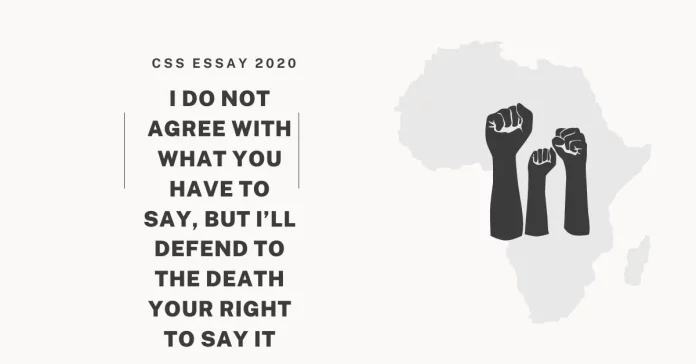Table of Contents
Introduction
The freedom of speech is a cornerstone of democratic societies, empowering individuals to express their opinions, ideas, and beliefs without fear of censorship or reprisal. Voltaire’s famous quote, “I do not agree with what you have to say, but I’ll defend to the death your right to say it,” encapsulates the essence of this principle. This essay delves into the significance of free speech, the importance of defending diverse viewpoints, and the complexities associated with upholding this right in a democratic society.
Exposition:
Understanding the Concept of Free Speech:
Free speech can be defined as the right to express one’s thoughts and ideas without interference or restriction. It is a fundamental human right recognized globally and enshrined in international legal frameworks. The concept of free speech has evolved over time, rooted in historical struggles for intellectual freedom and emancipation from oppressive regimes.
The Role of Free Speech in Society:
Free speech plays a crucial role in the functioning of a democratic society. It enables the exchange of ideas, facilitates intellectual growth, and fosters societal progress. By encouraging open dialogue, free speech enhances democratic processes, strengthens civic engagement, and promotes the collective pursuit of truth. It also paves the way for the expression of diverse cultural, social, and political perspectives, contributing to a vibrant and inclusive society.
Argumentation:
Defending the Right to Express Diverse Views:
The value of intellectual diversity cannot be overstated. When individuals are free to express diverse viewpoints, it sparks critical thinking, innovation, and creativity. It challenges prevailing norms, stimulates healthy debate, and leads to a more comprehensive understanding of complex issues. By defending the right to express differing opinions, we foster an environment that encourages intellectual growth and broadens our collective knowledge.
Tolerance and Open Dialogue:
The principle of defending free speech, even when we disagree with the expressed views, is rooted in the concept of tolerance. Embracing diverse perspectives and engaging in respectful dialogue is essential for a pluralistic society. By listening to opposing viewpoints, we gain insight into different lived experiences, challenge our own biases, and find common ground for collaboration and understanding.
Protecting the Right to Dissent:
The right to dissent is a cornerstone of any democratic society. Allowing individuals to voice their disagreement with authority, policies, or popular opinion is crucial for social progress. History is replete with examples of dissenters who have played instrumental roles in bringing about positive change. By defending their right to dissent, we safeguard the very essence of democracy and promote a society that is responsive to the needs and aspirations of its citizens.
Challenges and Controversies Surrounding Free Speech:
While free speech is vital for a healthy democracy, it is not without its challenges and controversies. Balancing the right to free expression with the need to protect vulnerable groups from harm is a delicate task. The line between protected speech and harmful speech, such as hate speech or incitement to violence, requires careful consideration. Responsible speech, ethical considerations, and the promotion of inclusive dialogue are essential in navigating these complexities.
Description:
To illustrate the significance of free speech, it is essential to examine historical examples of the suppression of free expression and the adverse consequences for society. From totalitarian regimes to authoritarian governments, the curtailment of free speech has stifled innovation, hindered societal progress, and perpetuated injustices. Conversely, case studies highlighting the positive impact of free speech on societal development, such as the civil rights movement or the fight for gender equality, demonstrate its transformative power.
The advent of technology and the internet has brought both opportunities and challenges to the realm of free speech. While it has expanded the reach and accessibility of expression, it has also given rise to concerns about misinformation, online harassment, and the echo chamber effect. Finding a balance that preserves the benefits of technological advancements while addressing these challenges requires ongoing attention and adaptation.
Narration:
Personal anecdotes and stories can shed light on the power of free speech in individuals’ lives. Whether it be an individual standing up against social injustice, a writer challenging societal norms, or a dissident speaking truth to power, these narratives emphasize the courage and impact of individuals who exercise their right to free expression. By sharing these stories, we inspire others to embrace their voices and advocate for positive change.
Conclusion:
Defending the right to free speech, even when we disagree with the expressed views, is essential for the health and vitality of a democratic society. It fosters intellectual growth, stimulates critical thinking, and promotes societal progress. While there are challenges in balancing free speech with the need to protect vulnerable groups, embracing tolerance, open dialogue, and intellectual diversity can create an inclusive society that values free expression. By upholding the principles of free speech, we enable the exchange of ideas, encourage constructive debate, and ultimately cultivate a society that thrives on the richness of diverse perspectives.


